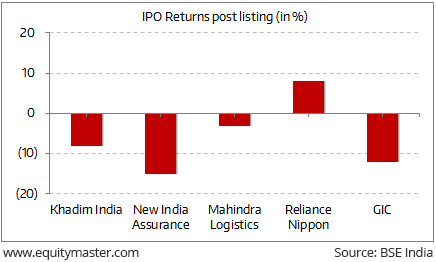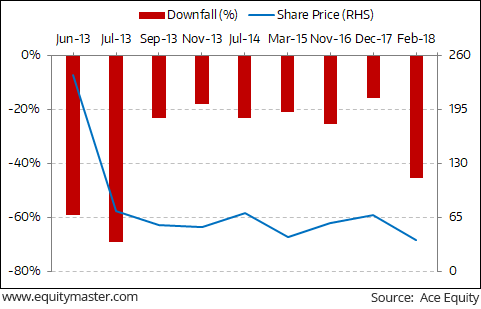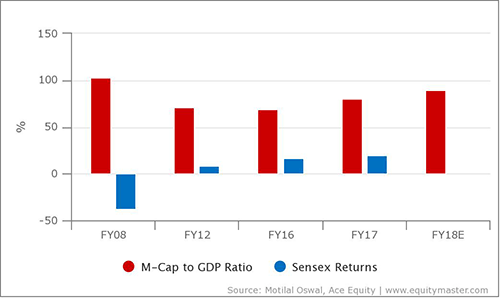After opening the day firm, share markets in India have continued the momentum and are trading comfortably above the dotted line. Sectoral indices are trading on a mixed note with stocks in the auto sector and stocks in the IT sector leading the gains, while stocks in the metal sector are trading in red.
The BSE Sensex is trading up by 151 points (up 0.5%), and the NSE Nifty is trading, up by 40 points (up 0.4%). Meanwhile, the BSE Mid Cap index is trading up by 0.1%, while the BSE Small Cap index is trading down by 0.1%. The rupee is trading at 64.96 to the US$.
In news from the IPO space. Bandhan Bank is set to come out with its own initial public offering (IPO) by next week. The bank plans to raise over Rs 44.7 billion from its share offering beginning on 15 March 2018.
The Kolkata-based bank and its shareholders will be selling up to 119.3 million shares, or about 10% of the post-issue share capital of the bank, in a price range of Rs 370–375 each in the IPO.
The bank will sell up to 97.7 million new shares in the IPO. International Finance Corp, part of the World Bank Group, and IFC FIG will sell 21.6 million shares.
Bandhan Bank’s IPO will the largest by a local bank.
The bank is majority controlled by its holding company Bandhan Financial Holdings Ltd (BFHL) which owns 89.7% of the stake. IFC and IFC FIG together hold 4.9% stake while Caladium Investment an affiliate of Singapore’s sovereign wealth fun GIC owns 4.99% stake. The IPO will ensure that BFHL’s stake falls to 40%. RBI timeline also stipulates that the holding company’s shareholding is cut further to 20% and 15% within 10 years and 12 years respectively.
The Kolkata based Bandhan Bank along with IDFC Bank received the final nod to start banking operations by RBI in 2015. One of the conditions of the license was public listing within three year which the bank will fulfil now. It started operations on August 23, 2015 and converted its microfinance business into a bank. As of September 2017, it had 864 branches in 33 states across the country.
Poor IPO Returns Post Listing

If you’ve been tracking the demand for IPOs, you would certainly think that 2017 was the year of IPOs. For one, IPO subscriptions were at sky high levels. But if the performance of recently listed IPOs are anything to go by, they have flattered to deceive.
Of the five recent high-profile IPOs which listed on the stock market, four have given negative returns soon after listing.
The IPO activity in FY17 is mainly driven by Offer for Sale (OFS) rather than fresh issues. An OFS is a route through which existing promoters and private equity investors offload their stake. Here, the money from the sale goes to the selling shareholder. Whereas, in a fresh issue, the money raised goes to the company who, normally, utilizes this money to repay debt, for capital expenditure, etc.
Also, the number of Private Equity (PE) investors exiting these companies raised a red flag. These PE investors had bought a stake in the IPO recently at a fraction of the listed price. Sensing the frenzy, they were able to offload their stake with multifold returns.
The only person left high-and-dry here was the retail investor. And, this is not a recent occurrence. The IPO euphoria is something similar to what was seen in 2007–08. More than 70% of the IPOs listed in 2007 and 2008 were in the red, even today when the Sensex is at an all-time high.
But it doesn’t make sense to completely ignore this space. The IPO space has also given us names like Maruti, TCS, and Jubilant Foodworks Ltd (with returns over 4,000%, 1,000% and 500% respectively) that have created immense wealth for shareholders.
For the retail investor, it is very important to ignore the noise and focus on the fundamental and valuations on the table. And more often than not, this approach works much better than following the herd.
That’s Ankit Shah’s approach at Equitymaster Insider. He keeps an eagle-eye on the developments in the IPO space and updates his readers on the big-ticket IPOs.
Ankit and his team of researchers constantly reference this handbook on investing in IPOs. You can download a copy for yourself. It is free. Just click here.
In news from the GST space. The Goods and Service Tax (GST) Council, is set to meet on Saturday to consider proposals to further delay rolling out the e-way bill system by about 5–6 months and levy GST on a concentrated form of alcohol.
The 26th GST Council meeting will also try to reach a consensus on simplifying tax returns.
E-way bills will automate the paperwork for goods transportation, check instances of inflating or under-reporting the value of consignments aimed at tax evasion, create an electronic trail of goods movement and generate valuable data about goods consumption pattern across the country.
The scheme, earlier proposed to be enforced from 1 February was deferred on the same day due to technical glitches. Policymakers now do not want premature roll out of the scheme risking a trade disruption.
Once implemented, e-way bill is needed for all movement of goods valued at more than Rs 50,000. within or outside a stat.
Every coin has two sides. GST is no exception. It has had its fair share of chaos in the months immediately post its implementation from 1 July 2017. Many businesses reported depressed earnings due to the transition to GST.
Our colleague Vivek Kaul has studied the finer aspects of the GST and predicted what could go right and wrong.
Download his special report — The Good, the Sad and the Terrible (GST).
This article was originally published in English at www.equitymaster.com
Read the complete Indian stock market update. For the terms of use, go here.




